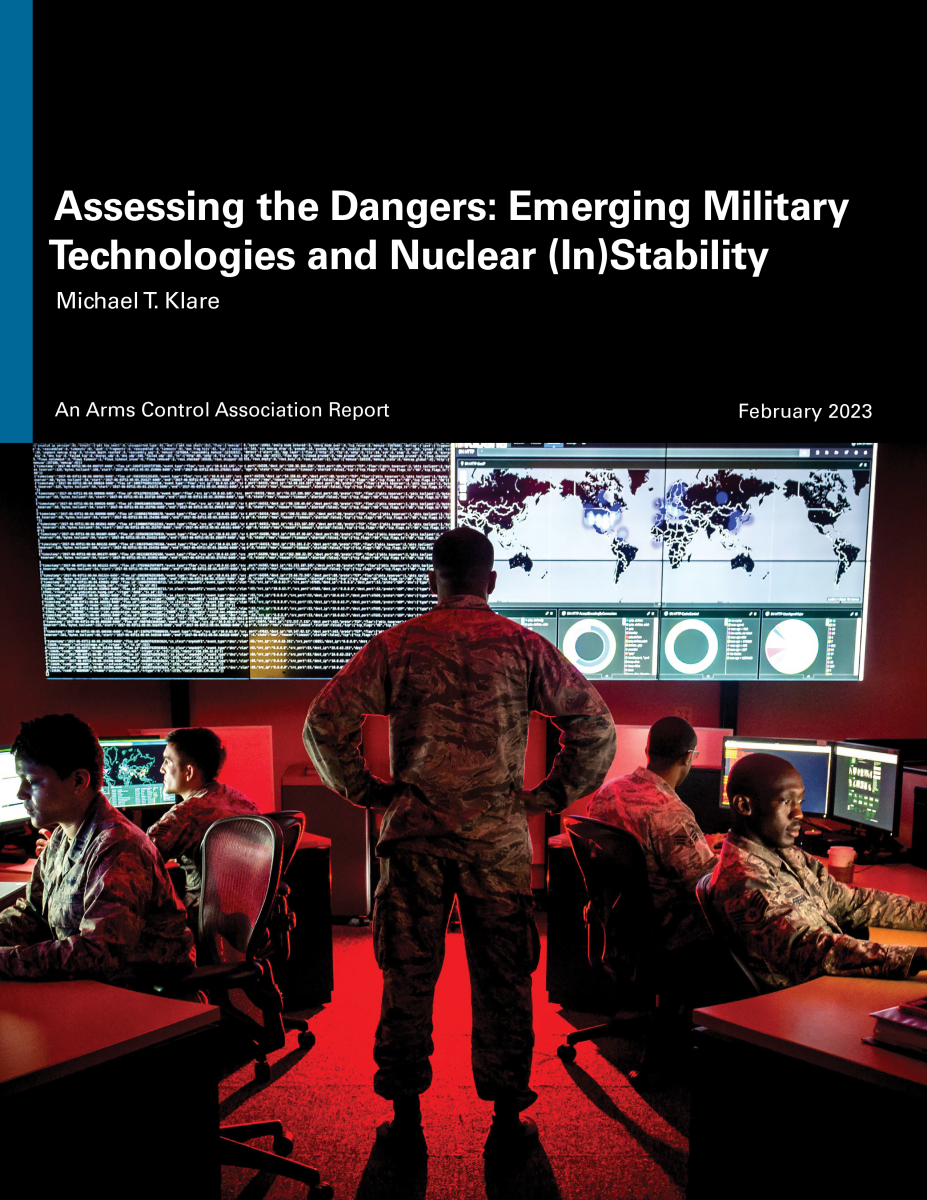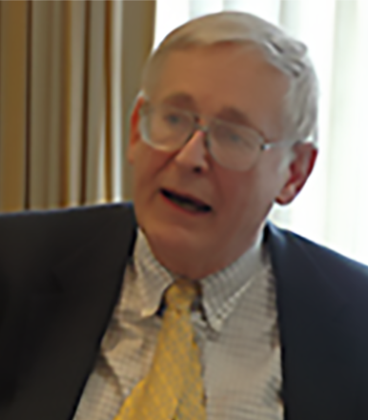Inside the Arms Control Association
May 2023
We are honored to have President Joe Biden's National Security Advisor, Jake Sullivan, delivering the keynote address at our Annual Meeting, “Reducing Nuclear Threats in a Time of Peril,” on June 2, 2023, at 9:00 am, at the National Press Club in Washington, D.C.
As President Biden wrote in his message to ACA at last year’s ACA annual meeting: “Today—perhaps more than any other time since the Cold War—we must work to reduce the risk of an arms race or nuclear escalation. In this time of intense geopolitical tension, arms control and nonproliferation diplomacy continues to be an essential part of safeguarding … global security."
Indeed, with the nuclear threat higher than at any time since the end of the Cold War, there is no more important time than now for Biden to show the way.
Sullivan will detail the President’s vision for heading off nuclear weapons competition, advancing nuclear arms control and nonproliferation measures, and reducing the risk of nuclear use. His remarks will come shortly after the Summit of G-7 Leaders on May 19-21 in Hiroshima, Japan, the target of the first atomic bombing.
Over the past several weeks, ACA has been working in coalition with expert colleagues and civil society organizations urging the President Biden to deliver a high-profile speech or statement to catalyze action to halt and reverse the nuclear arms race and renew disarmament diplomacy.
In April, ACA and the Ploughshares Fund organized a joint letter to President Biden signed by two dozen NGO leaders and experts urging the president to deliver a historic arms control speech at the G7 summit in Hiroshima. Our call to action has prompted coverage by global media outlets including Reuters, the BBC, and by Japan's Kyodo News and Asahi Shimbun, among others.
A May 5 op-ed in Just Security that I co-authored with John Tierney from Council for a Livable World provides more detail on what Biden could propose in Hiroshima. We suggest that Biden outline a “global nuclear freeze” approach involving all five nuclear-armed NPT states. We argue this would put "more pressure on Russia to refrain from further nuclear threats, increase the chance that Russia re-engages in disarmament diplomacy, put pressure on China to exercise nuclear restraint, and improve the long-term prospects for renewed progress on nuclear risk reduction and disarmament."
The Co-chairs of the Congressional Nuclear Weapons and Arms Control Working Group also wrote a letter to the White House urging President Biden to speak up about nuclear disarmament at the summit.
Before and after the G-7’s Hiroshima gathering, you can count on the Arms Control Association to press for meaningful action to move us back from the nuclear brink.
We hope you will join us at our June 2 Annual Meeting where we will explore these and other urgent nuclear arms control, nonproliferation, and disarmament challenges.
Register for June 2 Annual Meeting
In addition to National Security Advisor Jake Sullivan, our annual conference, which will run from 9:00 am to 4:30 pm, will also feature expert panel discussions on:
- Preventing a Three-Way Nuclear Arms Race
- Reducing Nuclear Risks and Reinforcing the Taboos Against Nuclear Use and Threats
- The Iranian Nuclear Crisis: Is There a Diplomatic Plan B?
- Risk and Regulation of AI in Nuclear Command and Control
Ambassador Alexander Kmentt of Austria, one of the key architects of the 2017 Treaty on the Prohibition of Nuclear Weapons will also deliver a keynote address over lunch in the noon hour.
You can register for the event at armscontrol.org/2023AnnualMeeting
As a bonus, meeting attendees will be provided a limited-time, early access to the new film In Search of Resolution from director/producer Robert E. Frye and The Nuclear World Project. The documentary film looks to the future, profiling individuals and organizations working to ensure these weapons are never used in war and presenting paths and ideas to deal with the most destructive weapon ever invented.
Members of the press may request complimentary registration to the Annual Meeting.
ACA Impacts Effort to Limit AI Role in Nuclear Launch
For several years, ACA has been looking at the implications of new military technologies on the uneasy nuclear balance (a.k.a. “strategic stability”) between nuclear rivals. One area of concern is the potential use of artificial intelligence in nuclear command and control and targeting.
 In 2020, ACA senior fellow Michael Klare organized a consultation with the National Security Commission on Artificial Intelligence (NSCAI) to warn against excessive reliance on AI-enabled command-and-control systems that in the heat of battle could result in precipitous escalatory actions, possibly leading to the early and unintended use of nuclear weapons. See our news story in Arms Control Today.
In 2020, ACA senior fellow Michael Klare organized a consultation with the National Security Commission on Artificial Intelligence (NSCAI) to warn against excessive reliance on AI-enabled command-and-control systems that in the heat of battle could result in precipitous escalatory actions, possibly leading to the early and unintended use of nuclear weapons. See our news story in Arms Control Today.
We argued that the NSCAI should underscore the importance of retaining human control over all decisions involving nuclear weapons and called for the insertion of “automated escalation tripwires” in command-and-control systems to disallow escalatory moves without human approval.
The NSCAI adopted these recommendations in its final report, which in turn, influenced the Biden administration’s 2022 Nuclear Posture Review, that states it is U.S. policy to “maintain a human ‘in the loop’ for all actions critical to informing and executing decisions by the President to initiate and terminate nuclear weapon employment.”
Now, as concerns about the wider societal implications of AI are on the rise, a bipartisan group of congressional leaders is seeking to codify the “humans in the loop” policy into law.
Reps. Ted W. Lieu (D-Calif.), Donald S. Beyer. (D-Va.) and Ken Buck (R-Colo.) introduced the “Block Nuclear Launch by Autonomous Artificial Intelligence Act” to safeguard the nuclear command and control process from any future policy change that would allow AI to make nuclear launch or targeting decisions. Senator Edward J. Markey (D-Mass.) has introduced companion legislation in the Senate.
For more analysis, see chapter 5 of the Feb. 2023 report (pictured above) by Michael Klare titled “Assessing the Dangers: Emerging Military Technologies and Nuclear (In)Stability."
At the June 2 Annual Meeting, senior policy analyst Shannon Bugos will moderate a panel discussion on “Risk and Regulation of AI in Nuclear Command and Control” with Helen Toner (Georgetown Center for Security and Emerging Technology), Paul Dean (U.S. State Department), and Chris Meserole (Brookings Institution).
CWC Coalition Readies for 5th Review Conference, May 15-19
Next week, states parties and some 150 NGOs will gather at the headquarters of the Organization for the Prohibition of Chemical Weapons (OPCW) in The Hague for the fifth review conference and the 25th anniversary of the Chemical Weapons Convention.
CWC Coalition chair, Paul Walker, and our new CWC Coalition coordinator, Mina Rozei, will be there to help facilitate and elevate NGO messages about the steps necessary to strengthen the treaty. They will host two side events and lobby for a more effective system for NGO participation in the CWC meetings.
For more on the RevCon, see the Chemical Weapons Convention Coalition's website, and our interviews in Arms Control Today with the U.S. envoy to the OPCW, and the president-designate of the review conference.
Remembering David Hafemeister
 We are sad to report that our colleague and friend, David Hafemeister, who led a long and illustrious career at the intersection of science and arms control, passed away on March 31, 2023, at the age of 88. Dave was a professor of physics at Cal Poly San Luis Obispo and lived a "bicoastal" life with his wife Gina. Dave worked as a senior staff advisor on nuclear proliferation and arms control matters for the Senate Foreign Relations and Governmental Affairs Committees and the U.S. Arms Control Disarmament Agency. He was involved in efforts to secure the Threshold Test Ban Treaty, START I, the Open Skies Treaty, and the Conventional Armed Forces in Europe (CFE) Treaty.
We are sad to report that our colleague and friend, David Hafemeister, who led a long and illustrious career at the intersection of science and arms control, passed away on March 31, 2023, at the age of 88. Dave was a professor of physics at Cal Poly San Luis Obispo and lived a "bicoastal" life with his wife Gina. Dave worked as a senior staff advisor on nuclear proliferation and arms control matters for the Senate Foreign Relations and Governmental Affairs Committees and the U.S. Arms Control Disarmament Agency. He was involved in efforts to secure the Threshold Test Ban Treaty, START I, the Open Skies Treaty, and the Conventional Armed Forces in Europe (CFE) Treaty.
Later, Hafemeister served as study director for the National Academy of Sciences (NAS) study on “Beyond START” and was the lead technical staff for the NAS on the CTBT. A prolific author throughout his career, he helped document improvements in the verification of the CTBT. He was chair of the American Physical Society’s Panel on Public Affairs and its Forum on Physics and Society. In 2022, he received the University of Illinois Alumni Achievement Award for his global work on arms control.
Webinar on the U.S. Nuclear Weapons Budget on May 23
The Physicists Coalition for Nuclear Threat Reduction will host a webinar next week, on Tuesday, May 23 2023, from 11:00 am to 12:00 noon ET that will review the proposed budget for nuclear weapons for fiscal year 2024 and the looming debate in Congress over key programs, including efforts by Republicans to add additional funds new, nuclear-capable sea-launched cruise missiles, which the Biden administration opposes.
The speakers will include:
- Shannon Bugos, Senior Policy Analyst, Arms Control Association
- Hans Kristensen, Director, Nuclear Information Project, Federation of American Scientists
To participate, you must register in advance.
ACA In the News
- ACA’s Daryl Kimball is among the "Ask the Experts: How Should the U.S. Address Nuclear Dangers?” post from the Carnegie Corporation of New York that suveys grantees offer guidance on ways the U.S. can help to avoid the escalation of nuclear dangers, May 10
- Kimball was featured in a Kyodo News article on how “Biden's leadership on nuclear disarmament to be tested in Hiroshima,” May 7.
- Kimball and former congressman John Tierney co-authored an op-ed in Just Security on how “Biden Must Deliver on Disarmament at the G7 Summit in Hiroshima,” May 5.
- Senior Fellow Michael Klare was cited in a column in the Atlantic, “Never Give Artificial Intelligence the Nuclear Codes” May 2.
- Politico spoke with ACA board chair Thomas Countryman regarding an agreement announced during South Korean President Yoon Suk Yeol’s six-day visit to the U.S. that reinforces the U.S. commitment to defend Seoul in the event of an attack by Pyongyang, April 27.
- Common Dreams cited senior fellow Michael Klare’s February 2023 report in reporting that a bipartisan group of U.S. Senators has introduced legislation meant to prevent artificial intelligence from launching nuclear weapons without meaningful human control.
- Policy director Kelsey Davenport spoke to the Christian Science Monitor about the U.S.-South Korea summit and how the “established nuclear order is under significant stress,“ April 25.
- Davenport was quoted in an April 22 Politico Magazine report on the impact of hostile, politically motivated social attacks on gender equality activists, journalists, foreign policy analysts, and historians working on issues related to Iran and its nuclear program.
- Research associate Gabriela Iveliz Rosa Hernández spoke with Russian media service, RBC, on the impact of Abrams tanks in the war in Ukraine, April 18.
